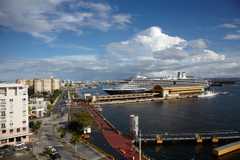Puerto Rico / San Juan
Debate of the 51st state
Should they stay or should they go? Puerto Ricans dither about becoming fully part of the US or seeking independence. Meanwhile the economy wobbles. But finally there seems to be a way forward.
Stand at San Juan’s harbourfront on any given afternoon and a towering cruise ship will moor, offloading thousands of mostly middle-American tourists. They head straight for the souvenir stalls that compete for attention with chain restaurant Señor Frogs and a down-market Sheraton casino. For many visitors this will be their first, and only, impression of the Puerto Rican capital.
Some do make it up the hill into Old San Juan, the city’s charming colonial core where Spanish-style houses in shades of pastel line cobbled streets, giving way to the Caribbean Sea. La Fortaleza, the governor’s sky blue mansion, is located here by the western sea wall. Inside, one room after another is filled with antique furniture and art and lit with chandeliers. Sweeping views take in the waterway leading in from the sea towards the Bacardi rum factory in the distance, its wind turbines slowly spinning.
This is where Puerto Rico’s governor Alejandro García Padilla lives and works. The youthful-looking 42-year-old took office last year in the midst of an eight-year recession and a decades-old debate over Puerto Rico’s political status, with billions of dollars in government debt.
The Puerto Rico-US relationship has long been a source of uncertainty and, for some, enmity. Officially an “unincorporated territory” with Commonwealth status, Puerto Rico has been under US control since an 1898 invasion took it from the Spanish. Puerto Ricans became US citizens in 1917 but have never had the right to vote in national elections.
Political leanings can be split primarily into three camps – those who wish to become the 51st US state, those who want independence and those, like the governor, who wish to remain a Commonwealth but improve the terms.
“The fact of being a state or being a republic doesn’t make the economy better,” says García Padilla. “You need to take your competitive advantages and maximise those advantages to bring capital to the jurisdiction.”
Puerto Rico’s recession has seen a 12 per cent drop in gross national product since 2006 and in February its bonds were downgraded to “junk” status by credit rating agencies Standard & Poor’s and Moody’s. The official unemployment rate is around 15 per cent, while public debt is 16th highest in the world at 96.5 per cent of gdp. More than a third of the population receives food stamps. But García Padilla’s administration claims it will get things under control. In February the governor announced a balanced budget for 2015 – the first in years. His turnaround plan: make Puerto Rico a Singapore for the Caribbean.
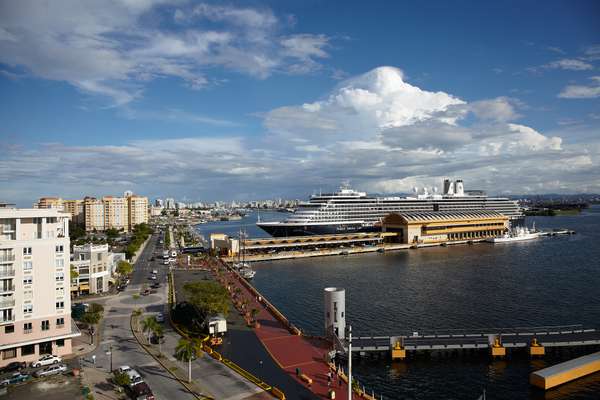
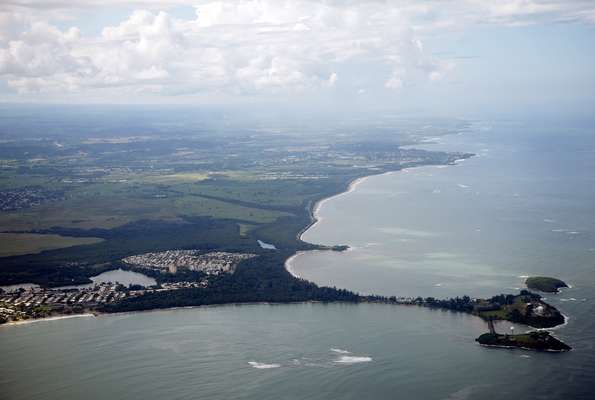
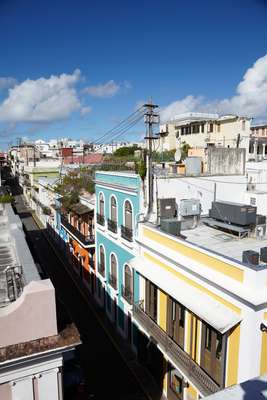
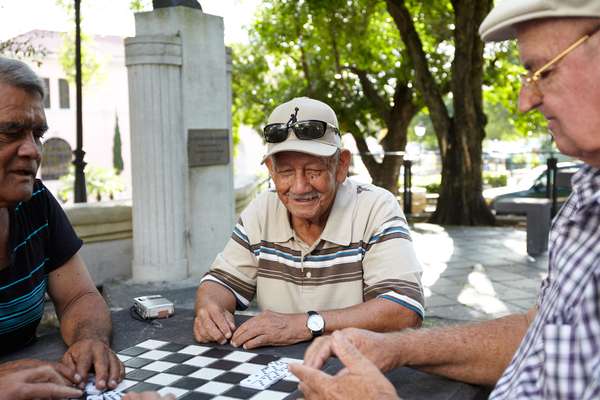
“Fifteen years from now I think Puerto Rico will represent the new miracle in economic development,” he says, noting that Singaporean leaders came to Puerto Rico in the 1960s to study its methods. “We did it in the past. Puerto Rico in 1940 was the poorest country in the hemisphere and in 15 years we became one of the most prosperous. That’s what we’re now starting again.”
He points to a strong pharmaceutical and medical devices sector, a special new 4 per cent tax rate to attract corporations that want to base themselves in Puerto Rico and export their services, and a push to promote small businesses, refocus on agriculture and attract more airlines to the island. These moves have had incremental effects – Avianca has restarted flights from Colombia and ibm has returned to the island. And though many locals continue to leave the island to find better-paying jobs, there’s a movement of Puerto Ricans coming back from abroad to help steer their island’s future.
“I wanted to participate in the life of my country and to have my daughters grow up Puerto Rican,” says journalist and writer Hector Feliciano, who has lived much of his life in Paris and New York. He seems confident about Puerto Rico’s prospects. “We have a history that lets us understand Africa and mulatto culture, we understand the Mediterranean from our Spanish heritage, we are part of Latin America and we understand the US. We are Spanish-speaking but we also speak English. We have a very important role to play in the world.”
And things are slowly changing on the ground. In Old San Juan residents are creating the kinds of businesses and institutions that the city has long lacked. Beta-Local offers educational resources for residents through courses, seminars and a residency programme. The Centre for Investigative Journalism, started in December 2007, is the first of its kind on the island, sponsoring work to hold large corporations operating in Puerto Rico accountable.
Caficultura on the Plaza Colón serves breakfast all day in a small but lovely space. Pablo Muñoz runs another smart-looking café, Cuatro Sombras, which features a coffee school for baristas and graders in the back room and a coffee farm two hours from town. He hopes to help resuscitate the island’s agricultural sector by restoring the brand value of Puerto Rican coffee, which once fetched high prices internationally. “We make sure that all the coffee we put into the market is of high quality so, little by little, we build up that brand again,” says Muñoz.
Juan Carlos Stolberg lived in New York for 13 years before returning to the island to launch Piloto 151, an organisation that supports local startups by giving them office space, business mentoring and networking opportunities, and helps firms looking to set up in Puerto Rico. “We are ‘US flag’, which means American rule of law. That provides stability,” says the 33-year-old. “And we have our own tax law so the foundations are there for business to boom. Puerto Rico is really the best of both worlds, from an investment standpoint.”
But the still-unresolved issue of Puerto Rico’s political status remains central for many. “My mother used to say, ‘I want to be independent but I need to eat’,” says Mayra Santos-Febres, who runs the Festival de la Palabra (the Festival of the Word) in which literary figures from around the world discuss their work and meet local literary talent. She lights a cigarette on her terrace overlooking the oceanfront neighbourhood of Condado, its residential blocks leading to high-rises along the water – a taste of Miami Beach in miniature. “We certainly have the means to feed ourselves but there are Puerto Ricans who’ve lived on welfare for four generations. This is a ghetto society because of all that federal aid. Llevate la [get it out of here],” she says with a wave of her hand.
Engage locals in such conversations and many will recount the story of Oscar López Rivera, Puerto Rico’s most prominent political prisoner. He was jailed 33 years ago on the US mainland for “seditious conspiracy” tied to a series of bombings by the Puerto Rican nationalist group Fuerzas Armadas de Liberación Nacional. For many independence-minded Puerto Ricans his continued incarceration is one of the more potent symbols of US oppression.
All around Puerto Rico are signs of the US presence. Much of it looks out of place. Along the harbour, a white suv from the Department of Homeland Security cruises slowly by. A US Postal Service worker delivers mail. The US National Guard posts recruitment ads around town and occupies a garrison on prime real estate facing the sea.
The Puerto Rican Independence Party is headquartered in a windowless office on a scruffy-looking block in San Juan’s “new city”, east of Old San Juan. Party president Rubén Berríos greets us warmly before launching into a story about Queen Juana I of Castile – better known as Juana la Loca, or Joanna the Mad. After the death of her husband, Philip the Handsome, as the story goes, she was so grief-stricken that she carted his corpse around Europe for months. “That’s what’s happening in Puerto Rico now,” says Berríos. “Those in power are running around with the cadaver of colonialism as if it were still alive. But it smells rotten.”
Here, amid the stacks of books and articles on historical figures and the busts of the New World’s great independence heroes José Martí, Simón Bolívar and even George Washington, Berríos and his team continue their struggle of the past 40 years to liberate Puerto Rico from the US. Take the country off benefits and endure some short-term pain, he says, and it’ll emerge a self-sufficient nation, one that can participate as an equal in the international marketplace with diplomats and embassies to represent its interests abroad.
The problem: the majority of Puerto Ricans don’t actually want independence. The island’s economy relies heavily on aid from the US. Its $29bn (€21bn) budget in 2012 included $6.7bn (€4.8bn) in federal money, and the prospect of losing that is daunting. Many can’t help but think of Cuba or Haiti – neighbours seen as cautionary tales for a Caribbean island seeking to go it alone.
Puerto Rico’s problem is partly one of branding. Within the US it is viewed as a sunny place that doesn’t require a passport to enter, while outside it is more or less unknown. It would be easy to sell it as much more than a stop on the cruise ship circuit. The El Yunque rainforest is a national treasure barely signposted from the road. The islands of Vieques and Culebra to the east can compete with the most beautiful pieces of land in the Caribbean. Very few know that Puerto Rico is the birthplace of salsa or that it has a unique African-Caribbean cuisine of its own.
Despite a muddled national image, a stalled economy and faltering politics, when it comes to a sense of national pride Puerto Ricans knows where they stands. What they want more than anything is to let the world know.
The options
Become the 51st state
Becoming a US state would enfranchise the population and remove the “second-class citizen” stigma, but would likely require a fundamental change: the only Spanish-speaking territories ever granted statehood (New Mexico and Arizona) were required to switch to English. Stricter federal tax rules would also apply.Independence
Independence would give Puerto Ricans control of their affairs – including a foreign diplomatic presence. But billions in US federal aid would be cut overnight and the island would lose US naval protection of its territorial waters. Only 5 per cent of the population supported the option in a recent referendum.- Remain a commonwealth
This would require no fundamental change to existing trade, aid and defence agreements with the US. Those in favour argue it would best allow the formation of Puerto Rico into a special economic area, which could compete with the likes of Singapore. But Puerto Ricans would remain disenfranchised, under an anomalous political system that has overseen a decline in living standards over recent decades.

